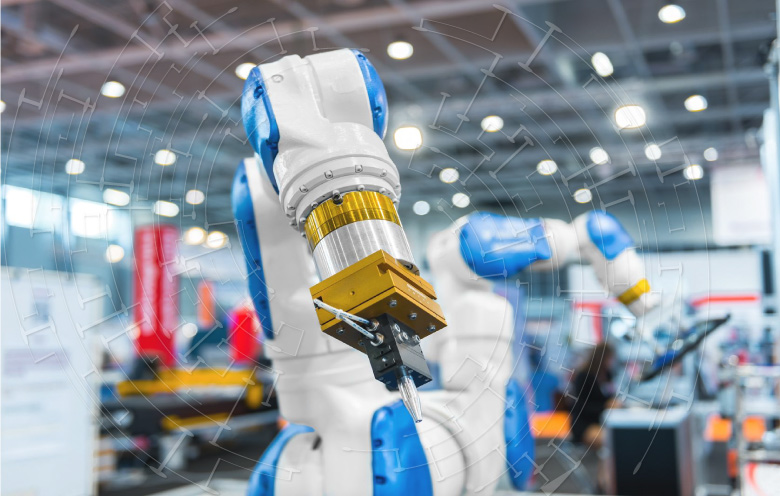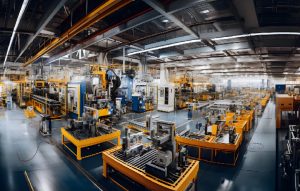The Industrial Revolution began centuries ago. It accelerated the automated manufacturing industry, giving mass-produced goods to the market. Ever since then there have been several innovations in the IT industry. And now the advent of 5G technology is about to bring the biggest transformation experienced by the industry ever.
Industry 4.0 will steer smart factories. And these factories will have connected devices allowing them to sense the surrounding environment and interoperate with each other to make decentralized decisions. And all this depends upon the fundamental capabilities of 5G networks.
5G networks in IoT applications will enable manufacturers and telecom operators to build smarter factories. And they will be able to take full advantage of technologies like the Internet of Things, artificial intelligence and augmented reality.
Tomorrow’s smart factories will be filled with sensors for monitoring different aspects of the working environment. They will include connected tools, use information such as location and accelerometer data to understand where and how they are being used, to guide workers accordingly. 5G’s high capacity, wireless flexibility and low-latency performance will make it a clear choice to support manufacturers in these environments. It promises to help them meet several challenges.

How Industry 4.0 is a game changer for factory owners
Webinar agenda
- How Industry 4.0 is a game changer
- The role of IoT and data analytics in the manufacturing industry
- IT/OT Convergence: Why it’s important for IoT adoption
- Current market trends and value
- Smart factory: The evolution not revolution
- Demo and review of smart production line monitoring
- Q&A session
The path to manufacturing
5G technologies will provide important network features for manufacturing. Manufacturers depend on fixed-line networks for the following requirements:
- Low latency and high reliability for supporting important applications
- High bandwidth and connection density for securing the overall connectivity
5G networks for smart manufacturing will enable manufacturers for better flexibility, lower costs, lesser lead times for reconfiguration of the production floor, and alteration in layout and modifications. The operators will have more industrial control, better planning and design systems, field devices and automation systems with 5G.
Gathering data for operational intelligence
With the arrival of 5G, networks will grow smarter and create greater information in comparison to the amount of data the existing networks gather. Manufacturers will have to get and decipher this information and derive actionable intelligence to increase productivity. Low latency and high-bandwidth capabilities of 5G networks will support this growing data. Along with increasing throughput, manufacturers will be able to reduce downtime with the help of insights derived out of the analyzed data. 5G-connected sensors will have the capability to gather all sorts of real-time information about the performance of equipment.
Troubleshooting with augmented reality
Augmented reality (AR) can help technicians in identifying and addressing the issues quickly. If a technician uses an AR solution, whether on a HoloLens or a tablet, it will be easy for him to identify and locate issues more quickly. This will save time in locating and resolving the problem and it would make it easy to share the data amid several production sites instantly.
By performing predictive maintenance on the collected data, companies can know when equipment will probably fail, and the technician can address the issue beforehand. With the help of AR and low-latency 5G-enabled headsets, the technician can fix the issue before the damage. A level 1 technician can travel to the site to do the repair while the engineers can guide him from the headquarters using context-sensitive 3D animations.
Potential benefits of artificial intelligence
Manufacturers find it challenging to keep up with the demand for more and more complex products due to the shortening of production cycles and following the quality standards at the same time. Along with predictive maintenance (as discussed above), AI can even help manufacturers in keeping the customer’s expectations for better and functional products by minimizing defect rates and cutting rework. AI can help in advanced quality control in factories, strengthen the present infrastructure and work resources to find mistakes and errors that hinder production and product quality.
Smart supply chain management
Till now, supply chain management has not been so efficient that we can have proper visibility into the delivery route. With the installation of 5G sensors in the next generation of wireless devices, we can expect to see package tracking at a completely different level. The installation of 5G sensors on the package will make it easy to find its location, temperature, humidity, g-force and moisture levels. This will not only remove the need for manual checkpoints, but it will also send you the real-time status of the item.
Conclusion
5G-enabled manufacturing will be based on a fully connected experience. 5G will help to bring major advancements, such as enormous device connectivity and innovative technology experiences, near real-time automation and network flexibility. It will lead to significant benefits like better performance, operations and improved security.
5G for industrial automation will empower manufacturers to drive more functionality. High reliability and low latency will facilitate the equipment to communicate with back-end systems wirelessly. This will simplify the process of addressing time-critical operational issues. Fast production-line operations will combine with networked intelligence giving birth to new capabilities like advanced visual recognition based on deep learning neural networks in the cloud.









